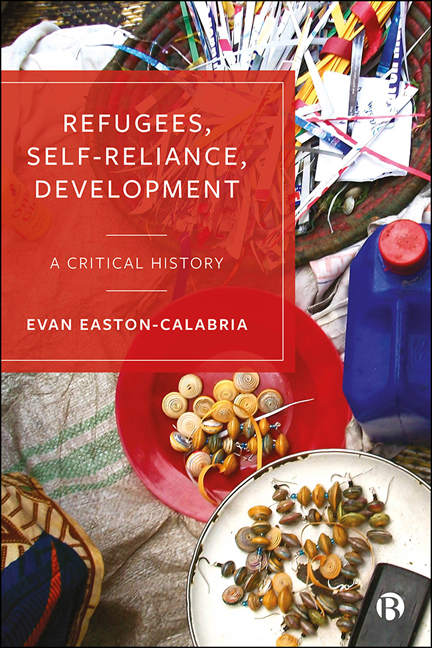Book contents
- Frontmatter
- Dedication
- Contents
- List of Figures and Tables
- Abbreviations and Acronyms
- Notes on the Author
- Acknowledgements
- 1 Introduction: Why Refugee Self-Reliance?
- 2 Self-Sufficiency out of Necessity: Refugee Self-Reliance Assistance in Interwar Greece
- 3 Socialism and Self-Reliance: Refugee Self-Reliance Assistance in Post-Colonial East Africa
- 4 Warriors of Self-Reliance: Refugee Self-Reliance Assistance in Cold War Pakistan
- 5 Dignity in Informality? Urban Refugee Self-Reliance Assistance in Kampala, Uganda
- 6 Livelihoods 2.0? Refugee Self-Reliance and the Digital Gig Economy
- 7 Conclusion
- Annex: A Note on Methods and Sources
- References
- Index
5 - Dignity in Informality? Urban Refugee Self-Reliance Assistance in Kampala, Uganda
Published online by Cambridge University Press: 12 October 2022
- Frontmatter
- Dedication
- Contents
- List of Figures and Tables
- Abbreviations and Acronyms
- Notes on the Author
- Acknowledgements
- 1 Introduction: Why Refugee Self-Reliance?
- 2 Self-Sufficiency out of Necessity: Refugee Self-Reliance Assistance in Interwar Greece
- 3 Socialism and Self-Reliance: Refugee Self-Reliance Assistance in Post-Colonial East Africa
- 4 Warriors of Self-Reliance: Refugee Self-Reliance Assistance in Cold War Pakistan
- 5 Dignity in Informality? Urban Refugee Self-Reliance Assistance in Kampala, Uganda
- 6 Livelihoods 2.0? Refugee Self-Reliance and the Digital Gig Economy
- 7 Conclusion
- Annex: A Note on Methods and Sources
- References
- Index
Summary
[D] evelopment aid has a great … potential in terms of assisting the empowerment of refugees and enhancement of productive capacities and self-reliance … allowing them to be instrumental in … contributing positively to the development process.
Introduction
On the side of a dusty road in Kampala, the capital of Uganda, Justin talks about his ongoing struggles to practise medicine. Nursing, his profession in the Democratic Republic of Congo, from which he fled years ago, is now barred to him because he cannot afford to have his certifications translated into English. He also has not been able to find any organization to support him in doing so. He lives and volunteers as an adviser at the Bondeko Refugee Livelihoods Centre, a community centre founded and led by refugees. While he offers support to the centre's members, he is too afraid of being penalized to offer medical advice or care. He shares, however, that InterAid, UNHCR's implementing partner in Kampala, knows that he is a nurse and has even requested his help:
InterAid gathered all the refugee nurses for a meeting but trained us only to sensitise refugees in malaria … refugees must go all the way to InterAid just to get paracetamol. Or they go and wait two days to go to Mulago [Uganda's national referral hospital] for malaria. But there are many nurses here. We can diagnose and treat from right here at the Center!
The experience Justin relayed is echoed in the stories of many refugees in Kampala. Particularly for those who enter urban areas, informal work is their only option, despite many being professionally trained in their country of origin. Once doctors, nurses, lawyers, and teachers, many refugees are forced to become entrepreneurs in manual vocations in which they have only limited skills. Research shows that at least 52 per cent of refugees in Kampala are self-employed, while 41 per cent are employed by others, often fellow refugees, and 7 per cent are not employed. Many refugees who had gained professional qualifications in their country of origin struggle to pay the fee to have their documents translated and notarized, or lost their documents in flight. These challenges, combined with Kampala's limited formal market, mean that often even desperately needed professions in the country are excluded from refugees.
- Type
- Chapter
- Information
- Refugees, Self-reliance, DevelopmentA Critical History, pp. 127 - 161Publisher: Bristol University PressPrint publication year: 2022

